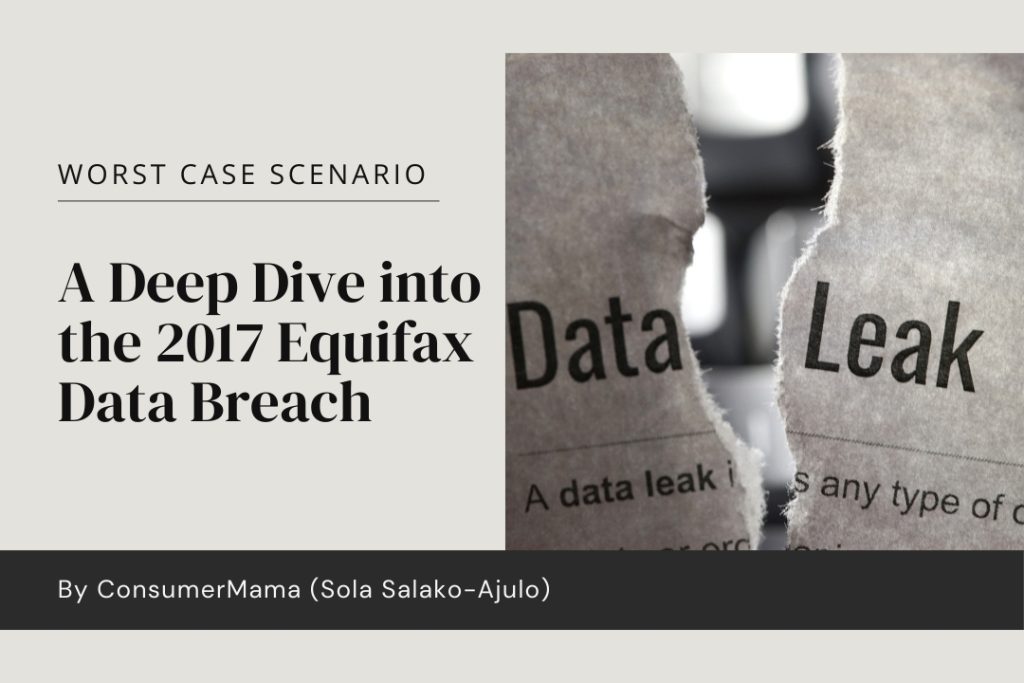By ConsumerMama (Sola Salako-Ajulo)
In the digital age, data breaches have become a critical concern for consumers and businesses alike. One of the most notorious incidents in recent history is the 2017 Equifax data breach, which exposed sensitive personal information of millions of individuals. This blog post delves into the details of the Equifax breach, its impact on consumers, and essential steps you can take to protect yourself from similar threats.
Understanding the Equifax Data Breach
What Happened? In September 2017, Equifax, one of the largest consumer credit reporting agencies, announced a massive data breach affecting approximately 147 million consumers. Hackers exploited a vulnerability in Equifax’s website, gaining access to sensitive personal data including Social Security numbers, birth dates, addresses, and in some cases, driver’s license numbers.
Why Was It Significant? The Equifax breach was significant due to the scale of the data compromised and the sensitivity of the information exposed. Personal data obtained in such breaches can be used for identity theft, fraud, and other malicious activities, posing long-term risks to affected individuals.
How Did It Impact Consumers? The breach exposed consumers to potential identity theft and financial fraud. With access to sensitive personal information, cybercriminals could open fraudulent accounts, apply for loans, and commit various forms of identity-related crimes without the victim’s knowledge.
Lessons Learned from the Equifax Data Breach
1. Importance of Data Security The breach underscored the critical importance of robust data security measures for organizations handling sensitive consumer information. Companies must prioritize cybersecurity protocols, regularly update software, and implement strong encryption to protect data from unauthorized access.
2. Transparency and Accountability Equifax faced significant backlash for its delayed disclosure of the breach and perceived lack of transparency in communicating risks to affected consumers. Transparency and timely notification are crucial in maintaining trust and enabling consumers to take proactive steps to protect themselves.
3. Consumer Rights and Protections Following the breach, regulatory scrutiny increased, highlighting the need for stronger consumer protections and regulatory oversight in data privacy laws. Consumers have the right to access and control their personal information, as well as the right to be informed about data breaches that may affect them.
Protecting Yourself: What You Can Do
1. Monitor Your Accounts Regularly monitor your bank accounts, credit card statements, and credit reports for any suspicious activity. Report unauthorized transactions immediately to minimize potential damage.
2. Freeze Your Credit Consider placing a credit freeze or fraud alert on your credit reports to prevent unauthorized access and protect against identity theft. This can make it harder for fraudsters to open new accounts in your name.
3. Use Strong Passwords and Two-Factor Authentication Enhance your online security by using strong, unique passwords for each account and enabling two-factor authentication (2FA) where available. This adds an extra layer of protection against unauthorized access.
4. Stay Informed and Vigilant Stay informed about data breaches and cybersecurity threats through reputable sources. Be cautious of phishing scams and suspicious emails requesting personal information.
Conclusion
The Equifax data breach serves as a stark reminder of the vulnerabilities inherent in today’s digital landscape. By understanding what happened, why it matters, and how to protect yourself, you can safeguard your personal information and minimize the risk of falling victim to identity theft and fraud.
For comprehensive guidance on protecting yourself from data breaches and other consumer threats, get your copy of my book, “Protect Yourself: Your Naija Guide to Consumer Rights & Protection”. Click here to purchase your copy today and take proactive steps towards securing your digital identity.
Stay informed and empowered,
ConsumerMama
Sola Salako-Ajulo
P.S.: Subscribe to our newsletter for more insights, tips, and updates on consumer rights and cybersecurity. Protect yourself and stay ahead of emerging threats!


